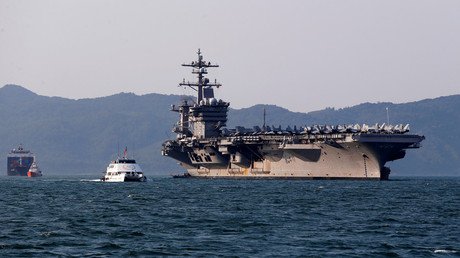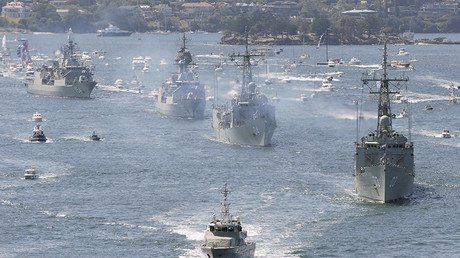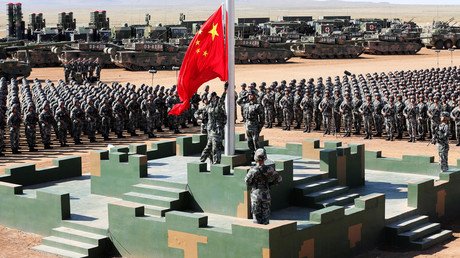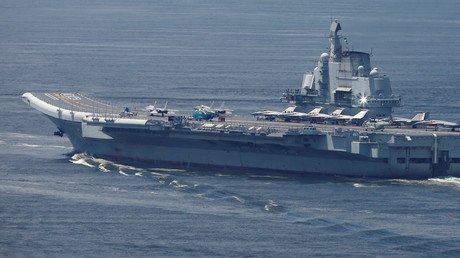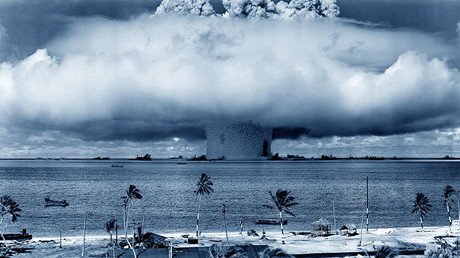Military base rumors stoke Western allies’ fear of losing the Pacific to China
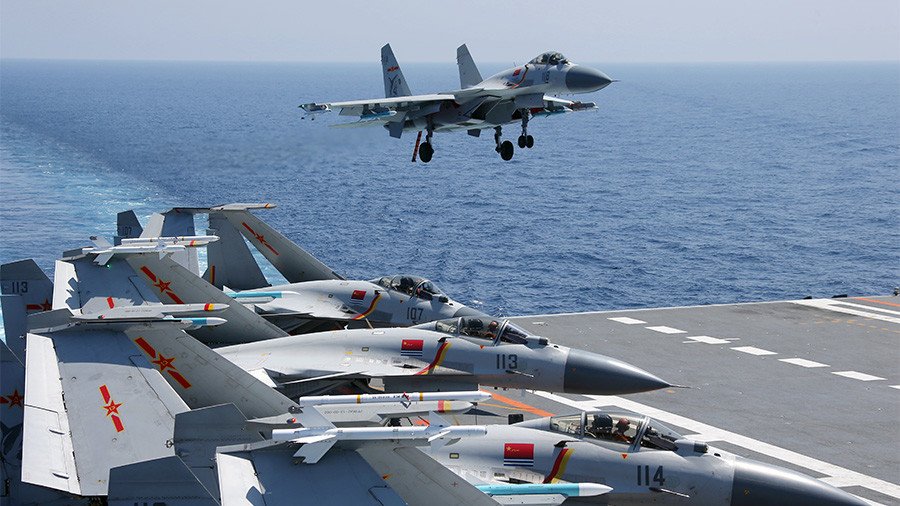
In early April, reports began emerging that China was seeking to build a military base in the Pacific. Are these reports “fake news,” or are we witnessing the early stages of a regional showdown between Western powers and China?
The unsubstantiated rumor of a Chinese military base in the Pacific was first reported on by Fairfax media this month, which cited unnamed sources while affirming that no formal proposal had yet been made. However, the report stated that the prospect of a Chinese military post close to Australia had been discussed at the “highest levels in Canberra and Washington.”
According to the report, a “base less than 2000 kilometres from the Australian coast would allow China to project military power into the Pacific Ocean and upend the long-standing strategic balance in the region, potentially increasing the risk of confrontation between China and the United States.”
The prospective Pacific island nation in question is Vanuatu, a country with a noticeably close relationship with China. While the Western powers, especially Australia, have become increasingly concerned by China’s growing military capacity in the South China Sea through its reclaimed reefs and artificial islands, Vanuatu has been one of the very few countries who have openly supported Beijing’s island-building program. China has also donated military vehicles to Vanuatu, invested millions of dollars in infrastructure, and reportedly accounts for nearly half of Vanuatu’s $440 million foreign debt.
The Allies’ Response
As one can imagine, the report of a looming Chinese military base was not welcomed at all by US allies in the region, particularly New Zealand and Australia.
Australian Prime Minister Malcolm Turnbull said at the time that he viewed “with great concern the establishment of any foreign military bases in those Pacific Island countries and neighbours of ours.”
“The maintenance of peace and stability in the Pacific is of utmost importance to us, to Australia — it’s one of the key priorities of the foreign policy white paper,” the prime minister also reportedly said.
In other words, Australia may seek to use this threat to justify a renewed militaristic foreign policy strategy of its own. After all, Australia has been sending warships to the South China Sea for military exercises even as recently as last year, and even felt it necessary to openly consider sending more vessels to confront China’s expanding influence just a few months ago. Australia also facilitated the proposal for a British warship, the HMS Sutherland, to depart Australia and voyage to the South China Sea to assert its so-called “freedom of navigation rights.” The US, for its part, sent warships to the South China Sea just this past month, as well as in January of this year, saber-rattling China in the process. Not to mention that Trump’s nominee for the US ambassador to Australia is a known anti-Chinese war hawk.
In solidarity with Australia, New Zealand’s prime minister, Jacinda Ardern, also voiced her opposition to what she termed the “militarization” of the Pacific, even though she hadn’t even been formally briefed on the issue at the time.
According to a prominent New Zealand outlet, the country’s government was seeking further information on the report and considering ways to respond. Deputy Prime Minister Winston Peters, a notorious anti-Chinese politician who just about rattles Chinese people any chance he gets, also said there are a “number of players doing certain things in the Pacific that are not good for the peace and security” of the Pacific. He also believed that it was time for New Zealand to “step up” and “do a whole lot more in the Pacific.”
In March of this year, Peters spoke about the Pacific becoming a “contested strategic space” which was “creating a degree of strategic anxiety.” He also vowed to pour more money and resources in the Pacific region, further indicating that New Zealand would back away from supporting China’s monumental Silk Road project even after New Zealand’s former government had already signed a memorandum of understanding in support of the project.
All this being said, both Vanuatu and China have already heavily denied the veracity of the report, rejecting the claim that China will be building a military base in Vanuatu.
“No one in the Vanuatu government has ever talked about a Chinese military base in Vanuatu of any sort,” Vanuatu’s foreign minister, Ralph Regenvanu, told Australian media. “We are a non-aligned country. We are not interested in militarisation.”
By way of confirmation, China also referred to the statements from the Vanuatu Foreign Ministry, which China believed had “cleared the record.” China even referred to the report as “fake news.”
Washington irked by China’s purported ambitions
Some of you may be wondering, if both Vanuatu and China have openly denied the story, then so what? Case closed, right?
As of now, China maintains only one foreign military base in the world, being in the Horn of Africa’s Djibouti. Allegedly, the establishment of this base represents the “first pearl of a necklace” unfolding along a sea route that will connect China to the Middle East.
According to the Diplomat, there are also “credible reports” of further plans to establish naval or military facilities in locations such as Timor-Leste, the Azores islands (Portugal) in the middle of the North Atlantic, Walvis Bay (Namibia) in the South Atlantic, and Gwadar (Pakistan), with other initiatives that may not have come to light as yet (including, for example, Sri Lanka).
Regarding Pakistan, unnamed Chinese military officials first told the South China Morning Post (SCMP) that Beijing was looking to build a naval base in Gwadar Port in the Pakistani province of Balochistan. Almost immediately, both Pakistan and China rejected these reports, even though the speculation initially came from Chinese military officials and not from the Western media. Sound familiar?
Back to the issue at hand, Fairfax’s report clearly indicated that Beijing’s military ambition in Vanuatu “would likely be realized incrementally,” perhaps taking shape with an “access agreement that would allow Chinese naval ships to dock routinely and be serviced, refueled and restocked.”
The report also makes note of the fact that China has invested heavily in a major new wharf on the north island of Espiritu Santo, which allegedly “raised eyebrows in defence, intelligence and diplomatic circles” in Australia because it has the potential to service naval vessels as well as commercial ones (Vanuatu already hosted Chinese warships throughout last year).
And here is where it gets interesting. Luganville, on the island of Espiritu Santo, actually housed one of the largest military bases in the entire Pacific battle theatre during World War II. Its geostrategic significance cannot be understated. Whoever controls Vanuatu controls the air and sea route between the United States and Australia. This is a deal-breaker not just for the United States, but for its local lackey-states Australia and New Zealand, who act as regional care-takers for Washington’s foreign policy interests.
Double standards, hypocrisy and the road to war
Nonetheless, it is the United States that currently boasts approximately 1,000 military bases worldwide, including military research bases located in the Pacific region. The US also maintains a military budget so astronomical it far exceeds that of China. Despite this, one would be hard-pressed to find any instances of a New Zealand or Australian government criticizing the American military presence in the Pacific (or its presence on the wider global chessboard in general).
A report last year by Commander Thomas Shugart and Commander Javier Gonzalez at the Center for a New American Security (CNAS) suggested that these US bases were becoming deeply vulnerable to attack by China’s ballistic missile capabilities, which could cripple US military capabilities in the Asia-Pacific region while using only a fraction of its arsenal should a confrontation emerge.
Though little regard is paid to it by the media, there’s a reason Australia and the US continue to send warships to the South China Sea. It’s the same reason China has responded with live-fire military exercises that began in the Taiwan Strait this week, as China sets out to prove that it is a force to be reckoned with in the region.
Despite New Zealand and Australia’s fear-based position on this issue, it should be borne in mind that there are alternative options to the dispute which could prove far more beneficial for regional security than our current trajectory. As The Diplomat’s David Brewster explained:
“Whether or not this reported proposal in Vanuatu comes to pass (and it seems less likely than more), Australia needs to better understand – and deal with – China’s growing interests in the South Pacific. If Australia sees itself as a regional leader, then it needs to show leadership in avoiding militarization of South Pacific. Rather than hoping to lock China out, Australia should be exploring ways of working with China that address some of its concerns in a manner that does not adversely affect Australia’s clear strategic interests. These issues are not going to go away.”
If only the West will heed Brewster’s much needed advice, the region might avert a heavily anticipated catastrophe.
Darius Shahtahmasebi for RT
Darius Shahtahmasebi is a New Zealand based legal and political analyst. Follow him on Twitter @TVsLeaking
Think your friends would be interested? Share this story!
The statements, views and opinions expressed in this column are solely those of the author and do not necessarily represent those of RT.

